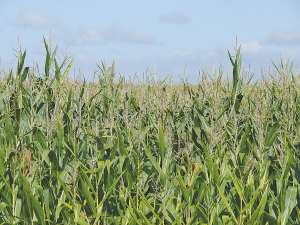Feds make case for rural bank lending probe
Bankers have been making record profits in the last few years, but those aren’t the only records they’ve been breaking, says Federated Farmers vice president Richard McIntyre.
 The latest Arable Industry Marketing Initiative (AIMI) report estimates a 2023 maize grain harvest of 164,400 tonnes.
The latest Arable Industry Marketing Initiative (AIMI) report estimates a 2023 maize grain harvest of 164,400 tonnes.
For many North Island maize growers, the 2022/23 season has been one to forget and for some, it has been a financial disaster.
The latest Arable Industry Marketing Initiative (AIMI) report estimates a 2023 maize grain harvest of 164,400 tonnes, down 13% in 2022.
Despite a 4% increase in harvest hectares, yield was down 16%.
The situation could be even more grim, says Federated Farmers Arable Vice-President Jamie Blennerhassett.
This is because as of the June 1 survey date, 37% of the crop was still unharvested, he says.
"The very wet growing season means across the wider country it has been a bad season,” says Blennerhassett. “Maize grain crops in Northland, Bay of Plenty, the East Coast and right down to the Wairarapa are only at about 50% of long-term averages.”
He says that due to persistent rainfall and then Cyclone Gabrielle in February, some crops have been wiped out, especially in the eastern region between Napier and Gisborne.
“Despite replanting two or three times, at the end, some had nothing – and much higher costs than usual as well.
“It’s pretty devastating financially for those people.”
Maize silage crops fared better. The harvest, at an estimated 1,051,600 tonnes, was down 7% compared to 2022, with a lower yield (down 9%) from an increased harvest area (up 3%). Almost all the harvest was in by June 1.
Most maize grain is sold for poultry and pig feed, with some going to dairy.
Blennerhassett says prices here are strongly linked to the cost of imported grain, and with the recent spike in world grain prices sparked by Russia’s attacks on shipments from Ukraine, "if we get dragged into those impacts the poultry guys’ costs could rise".
It’s unknown how much of the 37% of unharvested maize grain at the time of the June 1 AIMI survey has since been successfully brought in. The crop needs to be dried down for use and to keep the costs down of gas-fired drying plant.
A very poor season like this dents confidence. The AIMI report said maize grain spring sowing intentions (hectares) were 12% down on 2022 and for maize silage 3% down.
"The seed reps are saying there appears to be lower intentions to plant. A lot of the hectares in maize is land leased on year-to-year rollover and in some cases, the banks will draw a line on finance given the disastrous season some have suffered," Blennerhassett says.
"We traditionally have a south-westerly wind flow in New Zealand but with the La Niña phase we’ve been under it’s been the exact opposite, hence the heavy rainfall.
"We’re due to go back to an El Niño pattern but weather patterns have been so skew-whiff. It makes it so difficult for growers to plan."
The Ministry for the Environment (MfE) has found itself in a stoush with NZPork over the controversial National Policy Statement for Highly Productive Land (NPS-HPL).
Fonterra says the sale of its global consumer business and its Oceania and Sri Lankan operations could take 18 months to complete.
The lobby group the Methane Science Accord (MSA) says it welcomes a recent government move to seek outside advice on reducing biological methane targets, rather than relying on recommendations made by the Climate Change Commission.
Well-known scientist Jock Allison has passed away.
After a decade of consultation and court battles, Environment Southland has officially adopted a plan to prevent further decline in the region's water quality.
Farmers are throwing down the gauntlet to politicians - hold an independent inquiry into rural bank lending or face tough questions from the farming sector.

OPINION: Good on the UK'S NFU for battling to get supermarkets to prioritise local farmers' produce.
OPINION: Seven of the UK's major supermarket chains have now responded to the call for them to back the nation's…